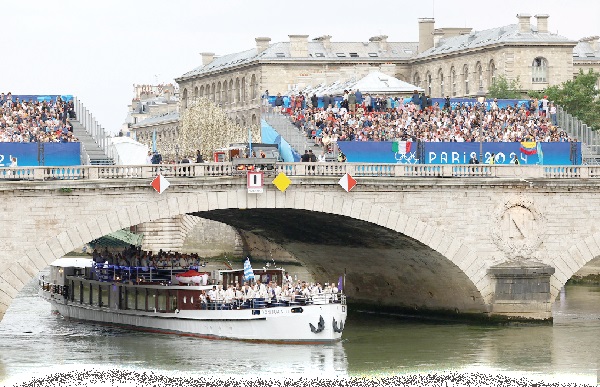
Olympic grandeur and financial realities: Spectacle, cost and economic impact of Paris Games
A grand affair with lasting effects last Friday, the City of Lights dazzled the world with one of the most spectacular opening ceremonies in Olympic history.
The French showcased their flair for style and grandeur, featuring some of the sports immortals of the past half-century in the torch relay, including legends like Carl Lewis, Marie-Jose Perec, Nadia Comaneci, Rafael Nadal, Serena Williams, Teddy Riner and Zinedine Zidane.
In a groundbreaking move, the outdoor ceremony broke away from tradition. Instead of the usual procession into an arena, 85 boats carried 6,800 athletes along the iconic Seine River, heading towards the majestic Eiffel Tower.
The Olympic flame ascended into the sky on a cauldron attached to a hot air balloon, creating an unforgettable spectacle that has set a new standard for future events.
For the next two weeks, Paris will be the epicentre of extraordinary performances and achievements, celebrating the human body, mind and spirit.
The French, renowned for their sense of style, have curated Paris 2024 to intertwine stunning athletic feats with the rich tapestry of French culture and lifestyle.
The opening ceremony featured a bold fashion show, with a tabletop at a costume banquet serving as the runway. Expect a unique blend of sports with opera, rooftops, cannons, croissants and wine, taking spectators on a varied journey through French history and culture.
The organisers have truly pushed the boundaries, ensuring the athletes experienced an unforgettable event last Friday.
Upon arrival at the Games Village, which includes the first-ever floating Games Village, with some athletes staying on the Aranui 5 cruise ship, Team Ghana captain Joseph Paul Amoah and his teammates, as well as each of the over 6,800 athletes, received a specially designed Samsung Galaxy Z Flip6 phone.
This device, featuring the Olympic Rings and Paralympic Agitos, is part of Samsung’s $26 million promotion and allows athletes to capture and share their experiences, including selfies on the medal podium, flooding social media with moments from the Games.
While the prestige and global attention of hosting the Olympics are undeniable, the economic benefits remain a hotly debated topic. Paris 2024 is estimated to cost over $9 billion, covering operating costs and direct and indirect infrastructure expenses.
This figure is significantly lower than the Tokyo Olympics, which was marred by COVID-19 restrictions and took place in empty stadiums, costing around $15 billion.
Hosting the Olympics has become an increasingly expensive affair, with concerns about the ballooning costs and their economic impact growing.
Economist Andrew Zimbalist points out that extensive studies over the last 30 years indicate that hosting the Olympics often fails to deliver the projected economic development.
Opinions on the economic impact of these international competitions are divided. Research by the University of Limoges' Centre for Law and Economics of Sport suggests that the 2024 Olympic Games could generate a net economic gain of between €6.7 billion and €11.1 billion for the Paris region.
This projection includes the overall economic impact of construction work, extra tourism, and event organisation on the Île-de-France region from 2018 to 2034.
The Paris Tourism Office anticipates up to three million tourists visiting Paris during the Games, potentially spending around €2.6 billion.
The history of Olympic Games costs reveals an escalating trend. Beijing's 2008 Summer Games exceeded $40 billion, Sochi's 2014 Winter Games approached $50 billion and Rio’s 2016 Summer Olympics cost around $20 billion.
MarketWatch reported that Tokyo 2020 was the most expensive Summer Olympics, costing an estimated $20 billion, followed by London 2012 at $17.1 billion and Rio de Janeiro 2016 at $15.6 billion.
In response to these growing concerns, the International Olympic Committee (IOC) introduced a plan in 2014 to make the Games more sustainable and the bidding process less costly by utilising existing sports venues in host cities.
Paris 2024 has taken this approach, rehabilitating many existing facilities and building fewer new ones.
The Paris Olympic Village will be converted into offices and housing in a historically impoverished neighbourhood, demonstrating a commitment to a lasting legacy.
Looking ahead to Los Angeles in 2028, a similar strategy is being employed. Dubbed the “No Build” Olympics, the organisers plan to rely on existing infrastructure, even holding some events 1,300 miles away in Oklahoma, which has facilities for softball and canoe slalom.
For spectators, the lavish opening ceremony and other events come with a hefty price tag.
Tickets for the opening ceremony ranged from €90 to €2,700, with closing ceremony tickets costing between €45 and €1,600.
Watching tennis stars like Nadal, Carlos Alcaraz, Novak Djokovic and Coco Gauff in qualification matches can cost up to €260, and up to €380 for medal events.
Boxing tickets reach €210 for early rounds and up to €520 for medal events. Basketball fans may pay up to €980 to see the men’s final, potentially featuring a star-studded USA team led by LeBron James.
In athletics, tickets for coveted events like the men’s 100m final range from €85 to €980 for medal events.
As the Paris 2024 Games unfolds, they promise to deliver an unparalleled blend of sports, culture and history, setting a new benchmark for future host cities.
The economic impact will continue to be scrutinised, but the legacy of these Games, both in terms of unforgettable spectacles and infrastructure improvements, is poised to leave a lasting mark on the City of Lights.
 Click the link to read your copy.
Click the link to read your copy.